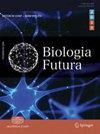Tetranychus urticae changes its oviposition pattern in the presence of the predatory mites, Phytoseiulus persimilis and Typhlodromus bagdasarjani
Q3 Biochemistry, Genetics and Molecular Biology
引用次数: 1
Abstract
Oviposition behaviors in herbivorous mites are affected by several factors i.e. food availability for juveniles and reduced predation risks. We used the twospotted spider mite, Tetranychus urticae Koch (Tetranychidae) to find out whether the previous presence of specialist/ general- ist phytoseiid predator individuals, Phytoseiulus persimilis Athias-Henriot/ Typhlodromus bagdasarjani Wainstein & Arutunjan (here, direct effect) or their previous odour perception by prey (here, indirect effect) would affect T. urticae oviposition strategies. Tetranychus urticae female individuals were placed on a leaf disc in a plastic container with predators either on the same disc (direct presence of predator) or on the second disc (receiving odours related to a predator) in the same container. Getting experienced, the prey individuals transferred to the oviposition container to their oviposition pattern parameters get recorded. The ovipositing T. urticae were monitored in two experimental situations: 1. Receiving odours related to the predator- prey interaction from the second leaf disc in the same oviposition container during their oviposition period, and 2. Receiving no odour. Our results showed that when T.荨麻叶螨在掠食性螨、persimilus Phytoseiulus persimilis和bagdasarjani斑疹虫的存在下改变了其产卵模式
草食性螨的产卵行为受多种因素的影响,即幼螨的食物可得性和捕食风险的降低。我们使用两种斑点蜘蛛螨,荨麻叶螨科赫(叶螨科)来发现以前存在的专业/一般的植物性捕食者,植物性掠食者,植物性掠食者,植物性掠食者,植物性掠食者,植物性掠食者,植物性掠食者,植物性掠食者,植物性掠食者,植物性掠食者,植物性掠食者,植物性掠食者,植物性掠食者,植物性掠食者,植物性掠食者,植物性掠食者,植物性掠食者,植物性掠食者,植物性掠食者,植物性掠食者,植物性掠食者,植物性掠食者,植物性掠食者,植物性掠食者,植物性掠食者,植物性掠食者,植物性掠食者,植物性掠食者,植物性掠食者,植物性掠食者。将斑纹叶螨雌性个体放在一个塑料容器的叶盘上,与同一容器中的捕食者在同一圆盘上(捕食者直接存在)或在第二个圆盘上(接收与捕食者有关的气味)。有了经验,猎物个体被转移到产卵容器中,记录它们的产卵模式参数。在两种实验条件下监测了荨麻疹夜蛾的产卵情况。在产卵期间,从同一产卵容器的第二个叶盘接收与捕食者-猎物相互作用有关的气味;没有气味。我们的结果表明,当T。
本文章由计算机程序翻译,如有差异,请以英文原文为准。
求助全文
约1分钟内获得全文
求助全文
来源期刊

Acta Biologica Hungarica
生物-生物学
CiteScore
1.40
自引率
0.00%
发文量
0
审稿时长
3 months
期刊介绍:
Acta Biologica Hungarica provides a forum for original research works in the field of experimental biology. It covers cytology, functional morphology, embriology, genetics, endocrinology, cellular physiology, plant physiology, neurobiology, ethology and environmental biology with emphasis on toxicology. Publishes book reviews and advertisements.
 求助内容:
求助内容: 应助结果提醒方式:
应助结果提醒方式:


